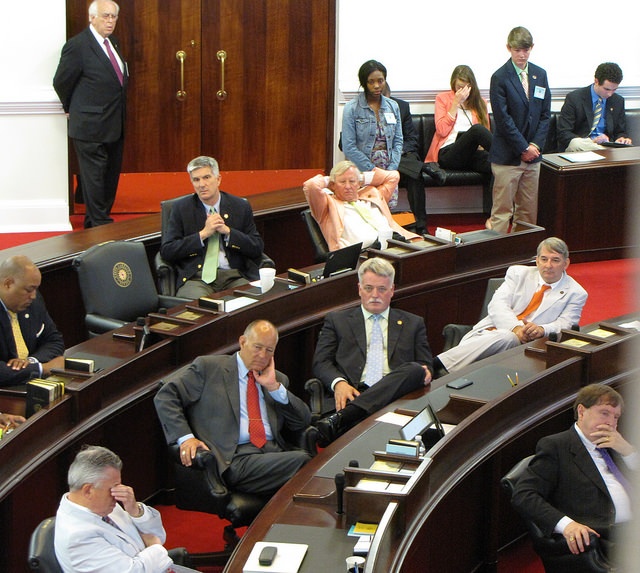Southern state legislatures: More male, more religious, more racially diverse

The North Carolina Senate in action. According to a new report, Southern legislatures are more male, more religious and more racially diverse than those in other regions. (Photo by Gerry Dincher via Flickr.)
The National Conference of State Legislatures in partnership with the Pew Charitable Trusts released a report last month that analyzed the diversity of state legislatures across the country. The report focused on representation among six demographic characteristics: gender, race and ethnicity, age, educational attainment, occupation and religion.
Nationally, it found that women and people of color continue to be underrepresented in legislatures and that their growing presence in statehouses has stalled in recent years. It also found that Baby Boomers born between 1946 and 1964 are over-represented while Millennials born between 1981 and 1997 are significantly underrepresented. Legislators are also more likely than the overall population to have a college or graduate degree, and nearly half are business people or lawyers.
Southern legislatures mirror many of these national trends, but a few key differences stand out.
Where are the women?
Women are underrepresented in state legislatures across the country, but the gender imbalance is especially dramatic in the South. While women make up nearly 25 percent of state legislatures nationally, the average in the South is just 18 percent. In Louisiana, Alabama and South Carolina, that figure is less than 15 percent.
A previous study found that women are extremely underrepresented among Southern candidates, which contributes to the problem. A report by Pew's Stateline magazine accompanying the recent study also notes the role that the partisan gender gap plays. Southern state legislatures are dominated by Republicans, and less than a fifth of Republican state lawmakers nationally are women, compared to over a third of Democratic legislators.
Religion still matters.
Home to the nation's Bible Belt, the South has long been known for the important role religion plays in its society and politics. Although Southern religiosity has been declining in recent years, the region's state legislators continue to report higher levels of religious affiliation compared to lawmakers elsewhere.
About 71 percent of Southern state legislators identify as Protestant, compared to 26 percent in non-Southern states. In Tennessee, Arkansas, Mississippi and Alabama, over 85 percent identify as Protestant. Compared to the rest of the country, relatively fewer identify as Catholic, other Christian or non-Christian.
More racial diversity — at least for now.
The South also stands out among U.S. regions for its relatively high share of legislators of color. Thanks to changes in the region's political landscape brought on by the Voting Rights Act, African Americans make up 16 percent of Southern legislatures. While this figure still falls short of their share of the overall region at about 22 percent, it is double the national average.
See a state-by-state, race-by-race analysis of Southern legislatures here:
However, gaps still exist — especially in terms of representation of the South's growing Latino population. While Latinos account for about 9 percent of the population in Georgia, North Carolina and Virginia, they make up only 1 percent of lawmakers in those states.
At the same time, the trend towards a greater number of African-American lawmakers has stalled in the South. With the Voting Rights Act weakened by the Supreme Court in 2013, and with increased racial gerrymandering in states like Alabama, Virginia and North Carolina, the future racial makeup of state legislatures in the South is uncertain.
Tags
Allie Yee
Allie is a research fellow at the Institute for Southern Studies and is currently studying at the Yale School of Management. Her research focuses on demographic change, immigration, voting and civic engagement.
